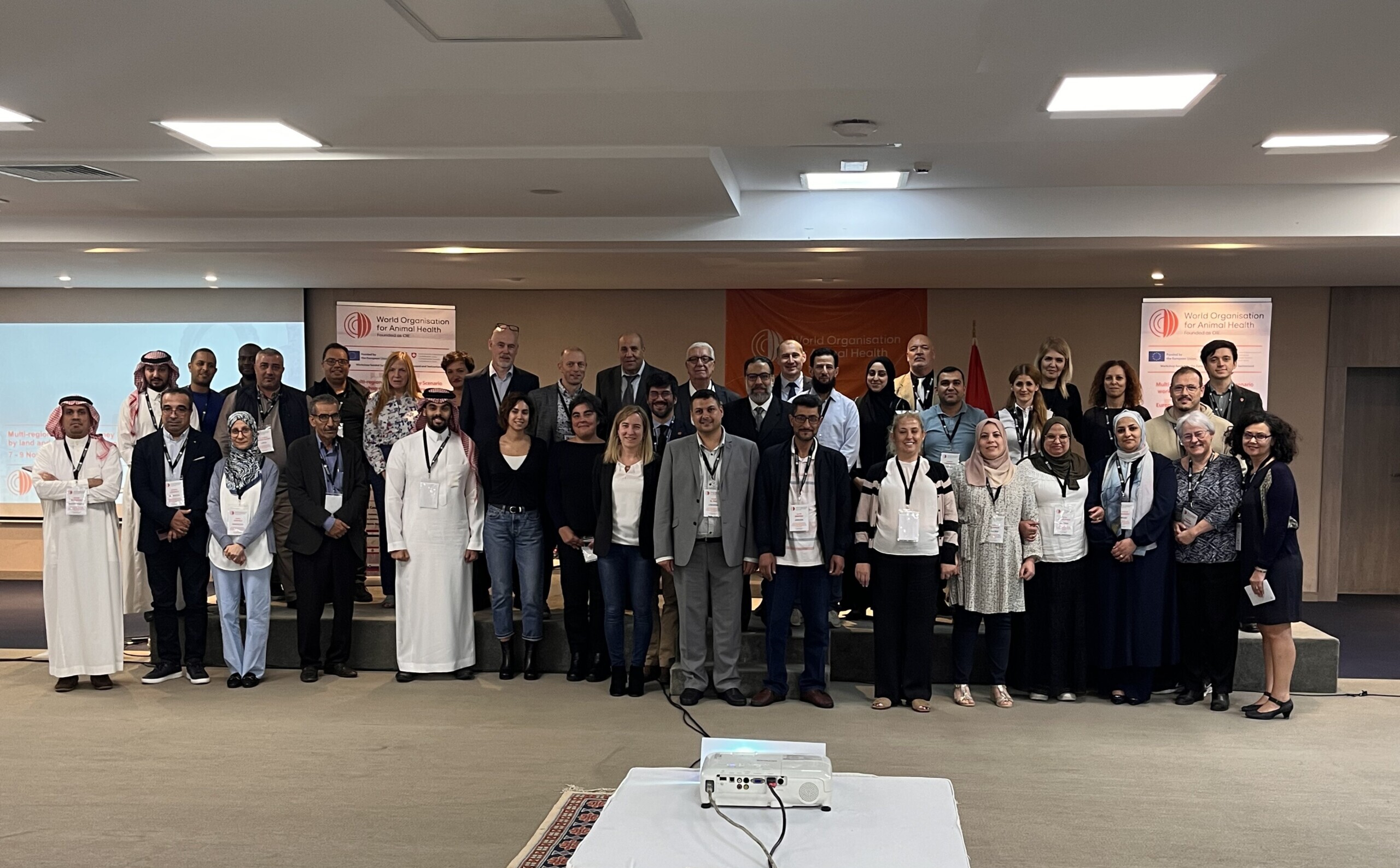The Multi-regional Whole Journey Scenario (WJS) Workshop on long-distance transport by land and sea between Europe, the Middle East and North Africa was held in Tunis, Tunisia, between the 07 – 09 November 2023, with the joint forces by the WOAH Sub-Regional Representations in Brussels and Tunis and the Regional Representation Office in Beirut.
The event had the participation of more than 35 participants from the different regions of Europe, North Africa and the Middle East.
The event was opened with a welcome message delivered by Prof Abderraouf Laajimi, Chef du Cabinet, Ministry of Agriculture Water Resources and Fisheries, Tunisia.
The workshop was built upon routes with similar transportation challenges identified through previous workshops and through the requests received from Members who transport live animals from Europe to the Middle East and North Africa. Representatives from 15 WOAH Members participated in the meeting, namely: France, Ireland, Portugal, Romania, and Spain from Europe; Jordan, Kuwait, Lebanon, Saudi Arabia, Türkiye and the United Arab Emirates from the Middle East; and Algeria, Morocco, Tunisia and Libya from North Africa.
The workshop’s main objectives were to help countries improve animal welfare during long-distance and cross-border transport in compliance with WOAH standards for the whole journey along the selected route, focusing on the responsibilities of the Competent Authorities over the entire journey. In addition, the workshop aimed to share best practices and strengthen collaboration and communication between Competent Authorities. Moreover, the workshop provided the opportunity to deepen Members’ understanding of the level of compliance with animal welfare standards and identify key issues, constraints, and/or challenges experienced while implementing these standards. The workshop highlighted the need for enhancing and strengthening communication and cooperation between Competent Authorities and all actors involved in transporting live animals, the importance of well-defined responsibilities, and appropriate planning and establishing emergency procedures.
The participants found the workshop useful and instrumental in improving multiregional collaboration. The participants called for further WOAH activities supporting and strengthening the collaboration between Competent Authorities, inter-regional cooperation, and sharing the experiences (workshops, training, development of IT tools, guidance documents, and checklist, harmonising information exchanges on transport animals).
The workshop included, on the final day, a field visit to the École Nationale de Médecine Vétérinaire de Sidi Thabet (ENVM), and to Fondation Nationale D’Amelioration de la Race Chevaline (FNARC).
Please find below the workshop agenda and the link for the presentations kindly delivered by our Members and colleagues.
Please find more info in the meeting report.
| Day 1: Tuesday 7th November | |
| Topics | Speakers |
| Welcome and opening remarks | Dr Rachid Bouguedour, WOAH SRR Tunis
Prof Abderraouf Laajimi, Chef du Cabinet, Ministry of Agriculture Water Resources and Fisheries, Tunisia Dr. Mohamed Ali Alhosani, WOAH SRR Abu Dhabi Dr. Tomasz Grudnik, WOAH SRR Brussels |
| Session 1: Setting the scene (chairman: Dr Rachid Bouguedour) | |
| WOAH global animal welfare strategy – transport activities. | Dr. Leopoldo Stuardo (WOAH Standard Department) |
| WOAH and WOAH mandate on animal welfare, regional Platforms and strategies. | Dr. Tomasz Grudnik |
| WOAH TAHC Chapter 7.2 and 7.3 | Dr. Tomasz Grudnik |
| Session 2: Understanding country’s situation and identifying key challenges | |
| Countries presentations (10’ per country) overview of state of play – legislation, main trading partners main challenges: France, Ireland, Portugal, Romania, Spain
|
EU countries
(chairman: Dr Tomasz Grudnik) |
| Countries presentations (10’ per country) overview of state of play – legislation, main trading partners main challenges: Jordan, Lebanon, Kuwait, Saudi Arabia, Türkiye, United Arab Emirates | ME countries
(chairman: Dr Mohamed Ali Alhosani) |
| Countries presentations (10’ per country) overview of state of play – legislation, main trading partners main challenges: Algeria, Libya, Morocco, Tunisia | North Africa countries
(chairman: Dr Rachid Bouguedour) |
| Discussion and conclusions. | |
| Day 2: Wednesday 8th November | |
| Working group exercises – case study
– Presentation (15 min) – Group work (45 min) Reporting (10 min each group) |
All (3 groups) |
| Discussion and conclusions | |
| Session 3: Addressing the challenges and best practises (chairman: Dr Leopoldo Stuardo) | |
| Australian Standards for the Export of Livestock and Exporter Supply Chain Assurance System | Dr. Carol Sheridan, Department of Agriculture, Fisheries and Forestry) |
| Emergency procedure | Romania |
| Communication between Competent Authorities | All |
| Transport of animals – NGO perspective | Ms. Silvia Meriggi, ICFAW |
| Sharing country experience: Framework for veterinary health controls on imports in Tunisia |
Dr. Iheb Bannouri, Tunisia |
| WOAH Twinning Project on Animal Welfare in NA – ENMV Sidi Thabet (Vet School), Tunisia & IZSAM Teramo, Italy | Pr. Souilem Ouajdi, ENMV |
| REMESA Scientific and Technical Office (STOR) – Role and relevant planned activities | F. Valentini WOAH SRR-NA |
| Q&A, discussion | |
| Session 4: Slaughter of animals (chairman: Dr Mohamed Ali Alhosani) | |
| WOAH TAHC Chapter 7.5 | T. Grudnik WOAH |
| Discussion | |
| Conclusions – Closing remarks | |
| Day 3: Thursday 9th November | |
| Field visit: ENMV, FNARC – Tunisia |

